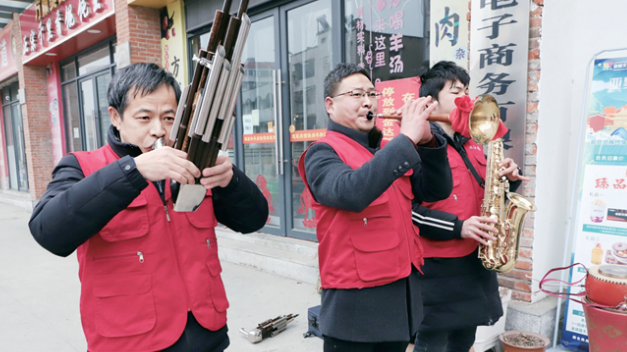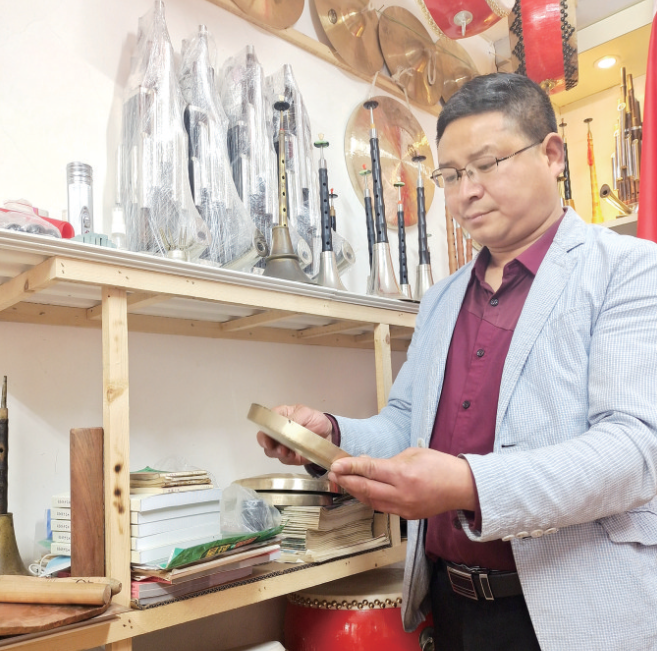Folk artist Zhou Zongyang's "One Piece of Love"

In love with Suona since childhood
Zhou Zongyang, 43, was born in Xiaoshigou Village, Wufeng Township, Yunyang District. The three generations of the family like Yunyang folk wind and percussion music. Grandfather Zhou Keshun is a well-known local suona player. He has been familiar with his ears and eyes since he was a child. His simple and dignified, rough and unrestrained wind and percussion music left a deep memory for Zhou Zongyang in his youth.
Whenever there was a wedding or a wedding in the village, my grandfather invited the suona gong and drum class to "play artillery". In his childhood, Zhou Zongyang would go to watch the fun with his grandfather and the gong and drum class. He would often touch the suona and look at the gongs and drums. He couldn't put it down and was always curious. Gradually, he fell in love with playing suona and "playing artillery". Although he liked it, he didn't have time to study it systematically. After graduating from the former Yunyang Finance School, he just learned some suona skills for the first time with his grandfather and the artists of the gong and drum class.
In 1999, Zhou Zongyang went south to work because of his livelihood. At this time, he could pick up his grandfather's suona and figure out some rhythms and play some out-of-tune sounds, and he didn't know how to score.
As a hobby, he bought a suona and learned slowly. When he went to work in the south, he brought his suona to the south, hoping to learn by himself during the part-time work. In Guangdong, in his spare time, he went to inquire about some musical instrument shops and wanted to learn how to play suona, but this kind of musical instrument is not popular in Guangdong, and there is no training institution that specializes in teaching suona, so he had to give up and practice on his own. After get off work, he often came to the park or square to play. However, in Guangdong, because there is no such atmosphere for playing suona, and there is no environment suitable for this kind of art, he was complained by people as noise when he played in public places, and he had to give up again.
In January 2009, after working in Guangdong for 10 years, he returned to his hometown with his beloved Suona.
Go to Henan to practice hard for learning art
After returning, Zhou Zongyang opened a building materials store on Dongling Street, Chengguan Town, Yunyang District. While managing his business, he still does not forget his hobby of playing suona. Whenever he has free time, he picks up the suona to grope for tones, all relying on self-study.
Until 2016, he gradually gained a little foundation through exploration. He wanted to find a teacher to learn the arts, so he found Liu Quanyong, a suona teacher at the Yunyang District Folk Culture Exhibition Center, and followed him to learn how to play suona.
Since his apprenticeship, Zhou Zongyang began to earnestly and systematically study music theory and folk tunes. "It's said that people over 30 don't learn art, but I was almost forty years old at this time, and it was obviously a bit late when I started to learn art from a teacher." Zhou Zongyang said.
After studying with a teacher, he gradually discovered his own inadequacies. After several inquiries, I learned that there is a training institution specializing in teaching suona in Dengzhou City, Henan Province. So, in the summer of 2018, he came to Duanying Suona Art School in Dengzhou to sign up and began to study suona art systematically. In this professional training institution, he gets up at 6 o'clock every morning to practice the exercises, starting from the mouth, lips, qi, tongue, fingers, etc. After three months of hard training, he has made great progress. Blow for 20 seconds, until you can blow for a minute in one breath.
After returning to Yunyang District, he initially followed the gong and drum class to do chores, and later he was able to play alone to lead the team.
After hard training, he and the gong and drum class have more and more opportunities to go out and run, and the skills of playing suona and "playing artillery" have been greatly improved. Whether it is playing suona, or musical instruments such as gongs, drums, cymbals, cymbals, etc., he can do it, and his playing and percussion skills are already handy.
Set up a club to inherit Yunyang traditional culture

Zhou Zongyang was very interested in musical instruments.
During this period, he found that the musical instruments sold by the local musical instrument stores in Shiyan were not suitable for "playing artillery", so he drew musical instruments such as gongs, drums, cymbals and cymbals suitable for Shiyan's local area according to the size and specifications commonly used in the place, and then contacted the manufacturer to ask the manufacturer to follow this pattern. Size and specification production. The musical instruments he designed and produced are very suitable for Shiyan's local traditional "playing artillery". To this end, he also applied for the trademark "Yanyangtian" for these musical instruments to facilitate sales.
In order to communicate and interact with local folk artists frequently, he rented a storefront on Dongling Street, Chengguan Town, Yunyang District, and set up the Yunyang District Folk Wind and Percussion Club, so that folk artists have a place to learn from each other, so that they can inherit Yunyang Traditional Culture.
There are great differences in local folk customs, especially for wind and percussion music. Even two adjacent villages play different ways. In "playing artillery", some horses gongs and some drums play. After the club was established, Zhou Zongyang convened these folk artists to unify the standards, and then incorporated other gameplay. His club quickly attracted local folk artists from Yunyang District, and folk artists from Yunxi County, Zhangwan District, Maojian District and other adjacent areas also joined in one after another. Even folk artists from Ankang and Baihe County, Shaanxi also came here. There are more than 50 members, and everyone often communicates with each other to improve their skills.
Usually, Zhou Zongyang often organizes club members to practice skills by the Han River. He purchased audio equipment and a complete set of musical instruments, set up a performing arts team, and registered the performing arts trademark "Hanjiang Yuan". Whenever there was a wedding or a wedding, he would organize staff to go there when he was invited.
Usually, he also organizes a group of fans of wind and percussion to play live broadcasts online, attracting many fans. In just a few years, his Douyin account has nearly 100,000 fans. He hopes to retain the cultural memory of the old Yunyang people and pass on the ancient folk art through this new communication method.
There are many folk songs, some singers have little contact with each other, and face the risk of being lost after a long time. Out of his hobby of traditional folk culture, Zhou Zongyang would always use his spare time to go to the countryside to collect and sort out folk songs. After collecting the recordings, he returned to the store, and then used the knowledge of music theory he had learned to organize and save these folk songs and scores to meet the needs of those netizens and singers to learn, so as to hope that more fans would join in and inherit "Playing artillery" is a Yunyang folk culture.
He successively collected hundreds of thousands of words of folk ballads, organized them into volumes of "filial piety songs in Northwest Hubei" (Volume 1 and 2), "Folk Wind and Percussion Music of Yunyang - Yunyang Folk Songs", etc., and composed and printed them.
Now, during the Spring Festival, Yunyang District organizes folk lantern performances, and Zhou Zongyang will bring the club's performance team to participate in the lantern performances to perform "playing artillery", striving to pass on this folk culture.
The Shengxiao blows the water and the clouds open, and the suona resounds through happiness. Zhou Zongyang loves the folk culture of "playing artillery", just as the calligrapher Qi Jufa inscribed for him "Yisheng and Suiai", it inherits Yunyang's traditional folk culture.
 渝公网安备 50010702504639号
渝公网安备 50010702504639号